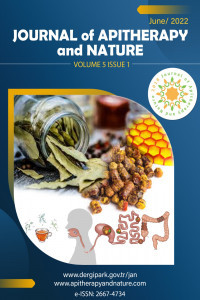The Effect of Dietary Supplementation with Propolis on Bacteria Colonization Pattern in Gastrointestinal Tract of Broiler Chickens
The Effect of Dietary Supplementation with Propolis on Bacteria Colonization Pattern in Gastrointestinal Tract of Broiler Chickens
Broiler Chickens, propolis,
___
- 1. Zafarnejad K, Nazar A, Mostafa R (2017) Effect of bee glue on growth performance and immune response of broiler chickens. Journal of Applied Animal Research 459: 280-284. 2. Khan SH (2017) Recent advances in role of propolis as natural additive in poultry nutrition. Bulgarian Journal of Apicultural Science 61: 167-183. 3. Kačániová M, Rovna K, Arpášova H, Čuboň J, Hleba L, Pochop J, Kunová S, Hašèik P (2012) In vitro and in vivo antimicrobial activity of propolis on the microbiota from gastrointestinal tract of chickens. Journal of Environmental Science and Health, Part A: Toxic/Hazardous Substances and Environmental Engineering 47: 1665-1671
- Yayın Aralığı: Yılda 2 Sayı
- Başlangıç: 2018
- Yayıncı: Oktay YILDIZ
İbrahim PALABIYIK, Didem SOZERI ATIK, Esra BOLUK, Sevgi KOLAYLI
Chemical Profiling of Tropical Propolis: Challenges and New Data
Milana POPOVA, Boryana TRUSHEVA, Kristina GEORGIEVA, Vassya BANKOVA
Chemical Profile of Greek Arbutus unedo Honey – Biological Properties
αrgyrο ANDREOU, Ioanna CHINOU, Konstantia GRAIKOU
Insights and Pitfalls in Propolis Research
Vassya BANKOVA, Milena POPOVA, Boryana TRUSHEVA
Some Apitherapeutic Properties of Chestnut Propolis
Sevgi KOLAYLI, Saliha EKSI, Zihni YAZICI, Oktay YILDIZ, Hüseyin SAHIN, Zehra CAN, Sengül KARAOGLU
İvan MISKULIN, İvana KLARIC, Matija DOMACINOVIC, Berislav PRAKATUR, Mirela PAVIC, Mario RONTA, Maja MISKULIN
Soumaya TOUZANI, Sleman KADAN, Abdalsalam KMAIL, Bashar SAAD, Badiaa LYOUSSI
A New Approach to Propolis Extraction
Saban KESKIN, Merve KESKIN, Sevgi KOLAYLI
Can Propolis Inhibit Infection Dynamics of Honey Bee (Apis mellifera L.) Viruses in vitro?
